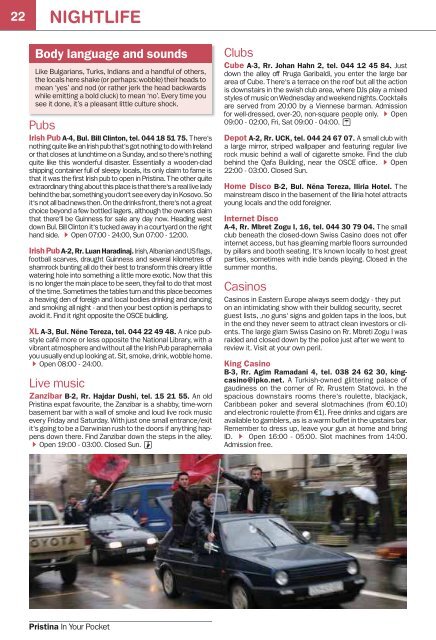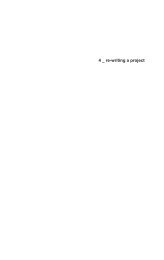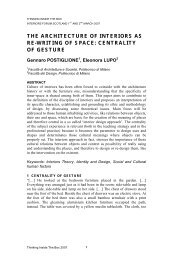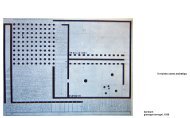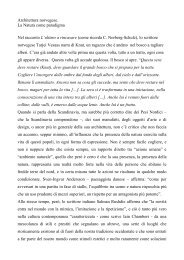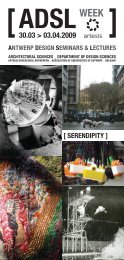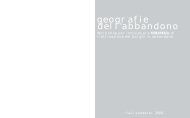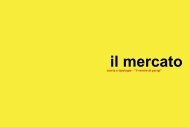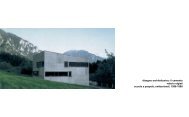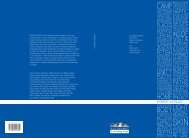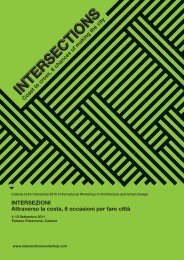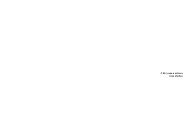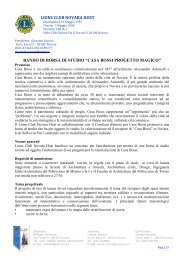Create successful ePaper yourself
Turn your PDF publications into a flip-book with our unique Google optimized e-Paper software.
22<br />
NIGHTLIFE WHAT TO SEE 23<br />
Body language and sounds<br />
Like Bulgarians, Turks, Indians and a handful of others,<br />
the locals here shake (or perhaps: wobble) their heads to<br />
mean ‘yes’ and nod (or rather jerk the head backwards<br />
while emitting a bold cluck) to mean ‘no’. Every time you<br />
see it done, it’s a pleasant little culture shock.<br />
Pubs<br />
Irish Pub A-4, Bul. Bill Clinton, tel. 044 18 51 75. There‘s<br />
nothing quite like an Irish pub that‘s got nothing to do with Ireland<br />
or that closes at lunchtime on a Sunday, and so there‘s nothing<br />
quite like this wonderful disaster. Essentially a wooden-clad<br />
shipping container full of sleepy locals, its only claim to fame is<br />
that it was the first Irish pub to open in Pristina. The other quite<br />
extraordinary thing about this place is that there‘s a real live lady<br />
behind the bar, something you don‘t see every day in Kosovo. So<br />
it‘s not all bad news then. On the drinks front, there‘s not a great<br />
choice beyond a few bottled lagers, although the owners claim<br />
that there‘ll be Guinness for sale any day now. Heading west<br />
down Bul. Bill Clinton it‘s tucked away in a courtyard on the right<br />
hand side. QOpen 07:00 - 24:00, Sun 07:00 - 12:00.<br />
Irish Pub A-2, Rr. Luan Haradinaj. Irish, Albanian and US flags,<br />
football scarves, draught Guinness and several kilometres of<br />
shamrock bunting all do their best to transform this dreary little<br />
watering hole into something a little more exotic. Now that this<br />
is no longer the main place to be seen, they fail to do that most<br />
of the time. Sometimes the tables turn and this place becomes<br />
a heaving den of foreign and local bodies drinking and dancing<br />
and smoking all night - and then your best option is perhaps to<br />
avoid it. Find it right opposite the OSCE buidling.<br />
XL A-3, Bul. Nëne Tereza, tel. 044 22 49 48. A nice pubstyle<br />
café more or less opposite the National Library, with a<br />
vibrant atmosphere and without all the Irish Pub paraphernalia<br />
you usually end up looking at. Sit, smoke, drink, wobble home.<br />
QOpen 08:00 - 24:00.<br />
Live music<br />
Zanzibar B-2, Rr. Hajdar Dushi, tel. 15 21 55. An old<br />
Pristina expat favourite, the Zanzibar is a shabby, time-worn<br />
basement bar with a wall of smoke and loud live rock music<br />
every Friday and Saturday. With just one small entrance/exit<br />
it‘s going to be a Darwinian rush to the doors if anything happens<br />
down there. Find Zanzibar down the steps in the alley.<br />
QOpen 19:00 - 03:00. Closed Sun. E<br />
Clubs<br />
Cube A-3, Rr. Johan Hahn 2, tel. 044 12 45 84. Just<br />
down the alley off Rruga Garibaldi, you enter the large bar<br />
area of Cube. There‘s a terrace on the roof but all the action<br />
is downstairs in the swish club area, where DJs play a mixed<br />
styles of music on Wednesday and weekend nights. Cocktails<br />
are served from 20:00 by a Viennese barman. Admission<br />
for well-dressed, over-20, non-square people only. QOpen<br />
09:00 - 02:00, Fri, Sat 09:00 - 04:00. B<br />
Depot A-2, Rr. UCK, tel. 044 24 67 07. A small club with<br />
a large mirror, striped wallpaper and featuring regular live<br />
rock music behind a wall of cigarette smoke. Find the club<br />
behind the Qafa Building, near the OSCE office. QOpen<br />
22:00 - 03:00. Closed Sun.<br />
Home Disco B-2, Bul. Nëna Tereza, Iliria Hotel. The<br />
mainstream disco in the basement of the Iliria hotel attracts<br />
young locals and the odd foreigner.<br />
Internet Disco<br />
A-4, Rr. Mbret Zogu I, 16, tel. 044 30 79 04. The small<br />
club beneath the closed-down Swiss Casino does not offer<br />
internet access, but has gleaming marble floors surrounded<br />
by pillars and booth seating. It‘s known locally to host great<br />
parties, sometimes with indie bands playing. Closed in the<br />
summer months.<br />
Casinos<br />
Casinos in Eastern Europe always seem dodgy - they put<br />
on an intimidating show with their bulldog security, secret<br />
guest lists, ‚no guns‘ signs and golden taps in the loos, but<br />
in the end they never seem to attract clean investors or clients.<br />
The large glam Swiss Casino on Rr. Mbreti Zogu I was<br />
raided and closed down by the police just after we went to<br />
review it. Visit at your own peril.<br />
King Casino<br />
B-3, Rr. Agim Ramadani 4, tel. 038 24 62 30, kingcasino@ipko.net.<br />
A Turkish-owned glittering palace of<br />
gaudiness on the corner of Rr. Rrustem Statovci. In the<br />
spacious downstairs rooms there‘s roulette, blackjack,<br />
Caribbean poker and several slotmachines (from N0.10)<br />
and electronic roulette (from N1). Free drinks and cigars are<br />
available to gamblers, as is a warm buffet in the upstairs bar.<br />
Remember to dress up, leave your gun at home and bring<br />
ID. Q Open 16:00 - 05:00. Slot machines from 14:00.<br />
Admission free.<br />
Like most Balkan cities, Pristina was a small and dusty market<br />
town until fairly recently. The city suffered bombing in the<br />
Second World War (and again during the 1999 Kosovo crisis)<br />
but unfortunately suffered most damage to its cultural monuments<br />
due to socialist planning and modern-day neglect. In<br />
the 1950s, demolition of parts of the old centre took place<br />
in the name of building a new socialist city - publications at<br />
the time boast that „old shop fronts and other shaky old<br />
structures are quickly disappearing to make room for fine tall,<br />
modern-style buildings.” The lovely little Catholic Church was<br />
demolished, as was the region‘s largest covered market, a<br />
mosque (which made way for the Iliria hotel), the synagogue,<br />
a hamam bath house and many Ottoman-era houses. The<br />
rivers Pristevka and Vellushka were hidden beneath concrete.<br />
This all goes to explain the apparent dearth of sights here.<br />
It‘s a scary fact that the careless attitude of the 1950s still<br />
lives on. Several listed buildings have disappeared without<br />
trace over the past few years and the remaining monuments<br />
are often in poor condition. What‘s even worse is that people<br />
protecting Pristina‘s cultural heritage are in danger. In 2000,<br />
city planner Rexhep Luci was conducting an inventory of<br />
destroyed historic buildings and unauthorised wild construction<br />
when he was murdered on the street; the crime is still<br />
unsolved and illegal buildings are still going up. Despite all<br />
this, it‘s pleasant to stroll around the former bazaar area,<br />
taking in the lively goings-on at the markets or watching the<br />
mosques fill up at prayer time.<br />
Museums<br />
Ethnological Museum (Emin Gjik complex) B-1, Rr.<br />
Zija Prishtina 1. The traditional 18th century house became<br />
part of the Kosovo Museum in 1957 and was turned into a<br />
small ethnographic museum in 2003. Known as Emin Gjik‘s<br />
house, a nickname for Emin Gjinolli, whose family owned the<br />
house, the complex holds the only original building left in the<br />
old bazaar area. QOpen 09:30 - 17:30, Sat, Sun 11:00 -<br />
15:00. Closed Mon. Admission free.<br />
Kosova Art Gallery B-3, Rr. Agim Ramadani 60, tel.<br />
22 78 33, gak@ipko.org, www.kosovaart.com. Close to<br />
the bizarre-looking central library this relatively large exhibition<br />
building is made up of two exhibition halls covering almost<br />
500 square metres and showcasing shows of mostly 2D work<br />
by local, and primarily young, artists. Owned and operated<br />
by the Ministry of Culture & Sports, the Kosova Art Museum<br />
also does a lot of educational work with young children. In<br />
front of the entrance stands Pristina‘s most interesting public<br />
artwork - a constellation of metal beams jutting out over the<br />
footpath like mikado sticks. Q Open 10:00 - 14:00, 15:00<br />
- 18:00, Sun 10:00 - 15:00. Closed Sun.<br />
Kosovo Museum B-2, Sheshi Adam Jashari, tel. 24<br />
99 64. This pretty ochre-painted villa housing the Kosovo<br />
Museum was built by Austrians for the Turkish army in 1898,<br />
and was used by the Yugoslav national army until 1975. The<br />
museum used to have a rich collection of prehistoric objects<br />
uncovered in Kosovo - these were all spirited off to Belgrade<br />
just before the troubles started in 1998 and many yet have to<br />
be returned. The main sight is the late Neolithic clay statue of<br />
the sitting goddess, found at Tjerrtorja in 1955 and featured<br />
in Pristina‘s city emblem. In front of the building lies the grandly<br />
named Archeological Park, which just contains a few stones<br />
and rusting artillery. The ‚no more guns‘ exhibition on the first<br />
floor ironically has weapons on display; AK-47s, hand grenades,<br />
hunting rifles, Bowie knives, 9mm pistols and nasty.50mm<br />
tripod-mounted sniper rifles. Texts are in Albanian only. Outside,<br />
you‘ll find the things they couldn‘t cart off to Belgrade - several<br />
Jewish and Muslim tombstones. QOpen 09:30 - 17:30, Sat,<br />
Sun 11:00 - 15:00. Closed Mon. Admission free.<br />
Ottoman Pristina<br />
Academy building B-2, Rr. Nazim Gafurri. Right next to<br />
the clock tower stands another of Pristina‘s few remaining<br />
19th century Ottoman konak-style private houses. It is currently<br />
used by the Academy of Arts and Sciences.<br />
Bazaar B-1. Pristina‘s liveliest area is without doubt the<br />
large bazaar, east of Rruga Ilir Konusheci. Although most of<br />
the old character was destroyed in the 1950s, it still retains<br />
the bustling atmosphere typical of all Balkan markets. All<br />
kinds of goods are for sale: fruit, vegetables, Albanian flags,<br />
cigarettes (stacked up in walls of cartons), kitchen utensils,<br />
car parts, dodgy mobile phones and more, making for a<br />
fascinating stroll. Many of the friendly traders are returned<br />
refugees and know German, Italian or English, and will be<br />
happy to strike up conversation.<br />
Carshi Mosque (Xhamia e Carshise) B-2, Rr. Meto<br />
Bajraktari. The ‚town mosque‘ or ‚stone mosque‘ is Pristina‘s<br />
oldest building, constructed in the 15th century by Turkish<br />
Sultan Bajazit to commemorate the 1389 victory. Now no<br />
longer part of the old bazaar complex but marooned right in<br />
front of the Kosovo Museum, the one-room mosque used to<br />
have a mausoleum, which didn‘t survive the ages.<br />
Pristina In Your Pocket<br />
2006 - 2007


